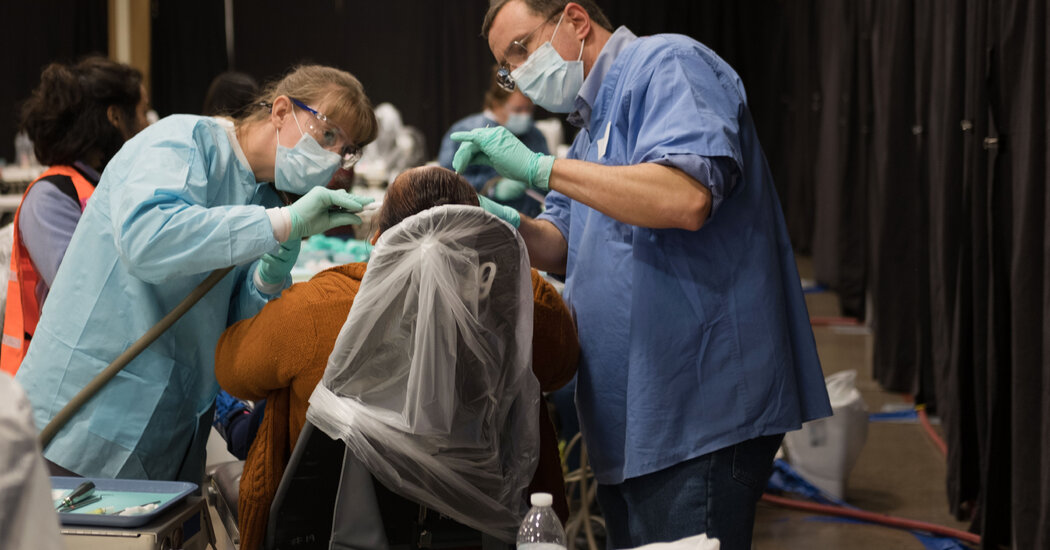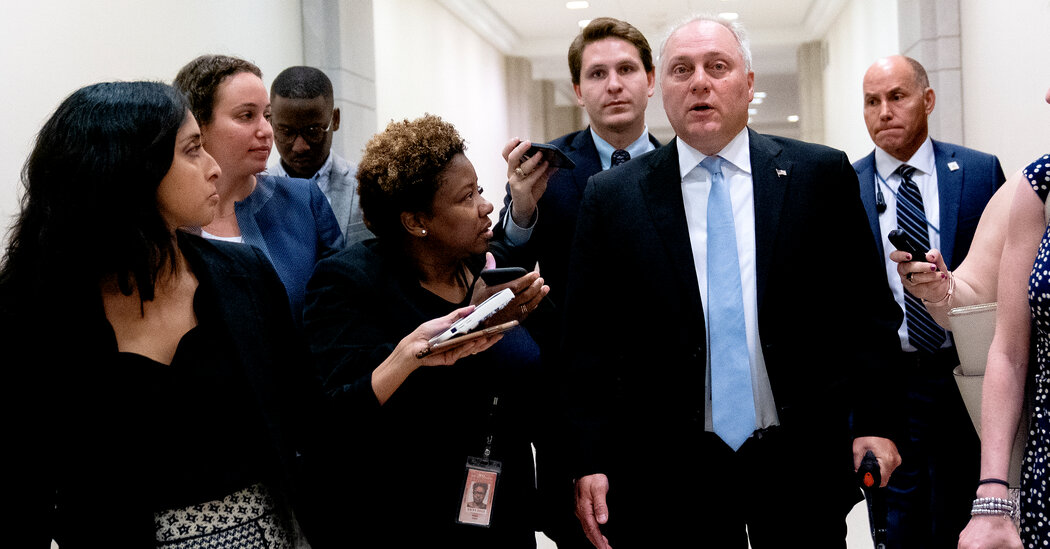Medicare Expansion Clashes With Health Care for the Poor as Budget Bill Shrinks
Under pressure to cut the bill’s cost, Democrats disagree over whether to offer more benefits to older Americans or to cover more of the working poor.WASHINGTON — Democrats are facing tough moral and political decisions over how to pursue their century-old dream of universal health care now that their ambitious $3.5 trillion social safety net bill will almost certainly have to be trimmed back.As they try to reduce the bill’s cost, members of the party disagree over whether to prioritize expanding coverage to more poor adults in states whose leaders have refused to do so or to give new Medicare benefits to older people across income levels.Southern Democrats, in particular, are urging their leaders to prioritize insurance coverage for 4.4 million working poor people in the 12 states, mostly in the South, with Republican or divided leadership that have refused to expand Medicaid under the Affordable Care Act. But progressives, led by Senator Bernie Sanders, the Vermont independent and former presidential candidate, are adamant about giving older Americans dental, hearing and vision coverage.Many provisions of the delicately constructed bill are interconnected, and division over how to lower prescription drug costs and raise taxes will likely prevent the party from acting boldly on both fronts.“I believe that health care is a human right, and if you believe it’s a human right, you don’t believe it’s a human right for 38 states,” said Senator Raphael Warnock, Democrat of Georgia, whose push for Medicaid expansion in his state was central to his special election victory last year, and who is eager to bring such an achievement to voters when he stands for re-election next year. “People are literally dying for lack of access to any care at all.”Health care has long been a winning issue for Democrats. It delivered them the House in 2018 and contributed to their taking the Senate in 2020, thanks largely to the runoff victories in Georgia of Mr. Warnock and Senator Jon Ossoff.But in raw political terms, most of the states that have refused to expand Medicaid — like Alabama, Mississippi, South Carolina, South Dakota, Tennessee and Wyoming — are out of reach for Democrats. Older Americans, on the other hand, are consistent voters, increasingly up for grabs. Those voters would like Medicare to start paying for dental, vision and hearing care.Some Democrats, moreover, say Congress should not reward states that refused to expand Medicaid by creating a separate insurance program, financed entirely by the federal government, for their working poor. Under the Affordable Care Act, states that expand Medicaid pay 10 percent of the cost. The topic came up during a recent policy luncheon for Senate Democrats.“Some members have raised the question of, if we do a Medicaid benefit for states that didn’t expand, those that did expand are going to feel like, ‘Hold on a second,’ ” said Senator Tim Kaine, Democrat of Virginia, though he said that was not his view.The provision allowing Medicare to negotiate prices with drug makers is in jeopardy and would mean a loss of about $500 billion that Democrats hoped to spend on expanding both Medicare and Medicaid.Paul Ratje for The New York TimesDemocratic leaders envisioned four major health care components to the bill: It would close the so-called coverage gap for Medicaid, reaching poor adults who earn too much to qualify for traditional Medicaid, but too little to qualify for private, subsidized insurance under the 2010 health care law. It would, for the first time, give Medicare recipients dental, vision and hearing care. It would extend recently enacted subsidies that help middle-income people buy insurance under the Affordable Care Act.All of that would be paid for by a provision allowing Medicare to negotiate prices with drug makers and tying drug prices to those paid by other developed countries.Republicans are largely absent from the conversation; they oppose the budget measure in its entirety, and thus are not weighing in on whether to expand Medicare or Medicaid. But they have long been opposed to letting Medicare negotiate drug prices, which they argue would stifle innovation in the pharmaceutical industry.That piece of the bill is now in danger. Last week, three Democrats sided with Republicans in the House Energy and Commerce Committee to strip it from the legislation. The House Ways and Means Committee did approve it, with one dissent, but if the prescription drug measure cannot survive a full House vote, it will mean a loss of about $500 billion in savings that Democrats hoped to spend on expanding both Medicare and Medicaid. The total cost would be about $600 billion over 10 years.Caught between those competing imperatives are lawmakers like Representative Lloyd Doggett, a senior Democrat on the Ways and Means Committee whose home state, Texas, has not expanded Medicaid. In a fight for scarce resources, he said, seniors who already have good coverage for most of their health needs under Medicare must take a back seat to the working poor who have no coverage at all.“I prioritize those who have been left out entirely,” he said. “They are desperate.”As committees in both the House and Senate work on writing their versions of the bill, Democrats across the philosophical spectrum are struggling to decide where their own priorities lie.Representative Charlie Crist, a Florida Democrat who was once his state’s Republican governor, noted that 800,000 of its residents do not have health insurance because the state leadership refuses to expand Medicaid. But Florida also has a significant older population that wants expanded coverage under Medicare.“I think you advocate for both; that’s my position,” he said. “It’s extremely important. We’re the richest country in the world and one of the few industrialized countries that do not provide health care for all our people, and we have to.”Senator Elizabeth Warren, Democrat of Massachusetts, said that “drug companies have the best lobbyists in town,” but that the party should not abandon clamping down on rising prescription costs to free up money for both priorities.“I say the choice is between the billionaires and people who don’t have health care,” she said.Pragmatists realize that some concessions will have to be made. Mr. Kaine said it was possible that Democrats would expand both Medicare and Medicaid in more modest ways, perhaps by phasing in benefits.The four House Democrats who have expressed opposition to the drug measures — Kurt Schrader of Oregon, Scott Peters of California, Kathleen Rice of New York and Stephanie Murphy of Florida — are enough to bring down the whole bill in the narrowly divided House. And more defections are likely from representatives with pharmaceutical interests in their districts, who have not had a chance to weigh in.Senator Raphael Warnock, Democrat of Georgia, made insurance expansion in his state central to his campaign last year.Stefani Reynolds for The New York TimesDemocrats who favor Medicare expansion have largely stayed quiet, given the sensitivity of the issue. But they see a political boon in the expansion approved by House committees last week. Seniors would see immediate coverage of vision care. In 2023, hearing would be added. Dental coverage, which would have to be created from scratch, would not begin until 2028.Medicare proponents say Congress has given the states that have not expanded Medicaid ample time and incentive to do so, and it is time to focus on other priorities. The $1.9 trillion pandemic rescue bill this year included huge new subsidies for those states if they agreed to expand Medicaid. Not one did.States pay as much as half of traditional Medicaid costs, but under the Affordable Care Act, the federal government pays 90 percent of costs for the expansion population.The two Georgia senators and Senator Tammy Baldwin of Wisconsin, which has also not expanded Medicaid, initially envisioned a Medicaid look-alike program run from Washington that would offer recalcitrant states even more federal funding if they finally joined Medicaid, relieving them of virtually any fiscal responsibility.Two House committees — Ways and Means and Energy and Commerce — adopted a measure last week that for now would extend existing premium subsidies under the Affordable Care Act to those now too poor to qualify for them, covering 94 percent of their total health care costs, rising to 99 percent in 2023. By 2024, the Department of Health and Human Services will have stood up a Medicaid-like program along the lines of the Senate proposal for those 4.4 million people.To some liberal Democrats, the plan seems unfair to the 38 states that have expanded Medicaid under the original terms of the health law — at a higher cost to those states.Mr. Warnock has a ready answer for that: “I would remind my colleagues that Georgia gave us the majority.”“We wouldn’t have the privilege of debating these priorities and a package that we’re putting forward if the people of Georgia had not stood up and sent me and Jon Ossoff to the United States Senate,” he added. “So we owe it to them to give them the coverage that they deserve.”
Read more →

